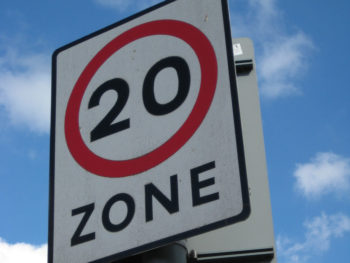Fleets urged to educate drivers on safety benefits of 20mph zones
Businesses are being asked to play their part in educating drivers that adhering to 20mph speed zones does save lives.

One in three drivers confess to regularly ignoring 20mph limits
As debate continues over the introduction of the 20mph speed limit on UK roads, a new survey by Venson Automotive Solutions reveals only 14% of drivers support its implementation in their area.
Meanwhile, one in three drivers confess to regularly ignoring the lower limit, despite data published by Brake indicating that a 20mph limit reduces the frequency of accidents involving fatal or serious injury by about 53%.
Simon Staton, client management director of Venson Automotive Solutions, said: “In the right places, such as residential streets, around schools and in busy pedestrian areas, slowing down can deliver huge safety benefits as well as help reduce harmful emissions and make our towns and cities nicer places to be. Despite media rhetoric, 20mph zones are not introduced arbitrarily, councils must go through Traffic Regulation Orders to reduce speed limits, to prove they are justified. They truly are there for a reason.”
Venson’s survey of 500 drivers also revealed that such zones have highest support in the South East (23%), which has the densest population in the UK, while in Wales, where the default speed limit was most recently changed from 30mph to 20mph, only 8% say they support their introduction.
The research chimes with a study carried out by Startline Motor Finance, which found seven out of 10 motorists (73%) say that the 20mph speed limit adopted in Wales shouldn’t spread across the rest of the UK.
Businesses using telematics can ascertain which of their fleet drivers need guidance or even training to ensure they comply with the 20mph limit, as well as recognise and reward those that actively respect the law.
Simon Staton added: “Restricting speed limits with 20mph zones has been proven to reduce road deaths. Of course, many fleet drivers are in high-pressured jobs with delivery targets and deadlines to meet, but nothing is more important than a person’s life. Fleet drivers should never feel under pressure to speed and by reinforcing the message that slower limits are in place to reduce road casualties and fatalities, businesses can garner greater support of them and bolster the good that they do.”
Recent weeks have also seen transport consultancy firm TRL (formerly the Transport Research Laboratory) and dashcam and speed camera detector firm Road Angel question political talk about 20mph zones being “anti-driver”.
Following the 20mph rollout in Wales, the UK government has said it’s reviewing guidance on 20mph speed limits in England “to prevent their blanket use in areas where it’s not appropriate” – part of its pushback on “anti-car measures” and reinforced in its Plan for Drivers, published ahead of a possible general election next year and widely regarded as a move to garner voter support.
TRL has said such political talk of ending the “war on motorists” should be questioned. It’s warned that the term “war” is associated with violence, yet it’s directed here at car drivers who are relatively safe in low-speed collisions, rather than the pedestrians and vulnerable road users who are at higher risk of severe injuries.
Shaun Helman, chief scientist at TRL, has said it’s time to shift the focus from a 20mph limit being a “war on the motorist” to a 30mph limit being a “war on the pedestrian” regarding injury severity.
And Road Angel has said it’s important that drivers understand the 20mph policies “are not anti-motorists, they are anti-death”.
Founder Gary Digva commented: “Lowering the speed limit in areas where there are a lot of vulnerable road users, such as cyclists and pedestrians, makes sense as it reduces the risk of fatalities should there be a collision.
“Not only does lowering the speed limit reduce the force and impact of a vehicle, but it also dictates if a driver is able to stop in time to avoid a crash.”












